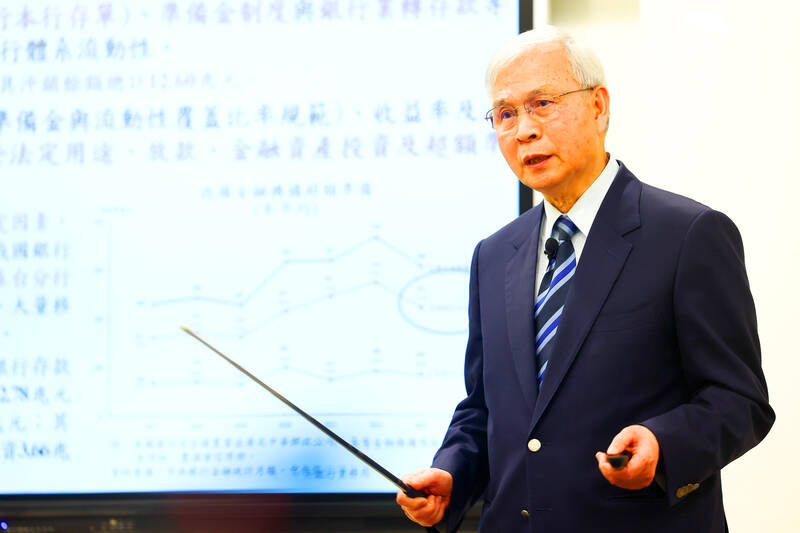The central bank’s board members in September agreed to tighten lending terms to induce a soft landing in the housing market, although some raised doubts that they would achieve the intended effect, the meeting’s minutes released yesterday showed.
The central bank on Sept. 18 introduced harsher loan restrictions for mortgages across Taiwan in the hope of curbing housing speculation and hoarding that could create a bubble and threaten the financial system’s stability.
Toward the aim, it cut the loan-to-value ratio by 10 percent for second and subsequent home mortgages and denied grace periods for first mortgages if applicants already owned other residential properties.

Photo: CNA
One board director said that some people have taken advantage of the grace periods — when borrowers need only pay interest — and resold properties for profit before the grace periods expired, the minutes showed.
The director panned the practice, calling it short-term speculation that has contributed to increases in home prices — making owning a home increasingly unaffordable for people with real demand.
The director said that more forceful measures should be introduced to rein in housing credit, warning that a reversal in housing prices or a hard landing could hurt Taiwan’s financial stability.
First-time mortgage applicants who own multiple residential properties account for nearly 20 percent of applications, the central bank said.
The central bank later backed off and allowed inheritors to qualify for grace periods.
It also removed credit controls for people who have inked home purchase agreements, but have not yet secured bank loans, and for people who need to relocate for family and working reasons, as long as they sell their prior homes within a year.
Another board director said that the latest credit controls were harsher and more expansive, as they extend nationwide, rather than being restricted to the six special municipalities, as well as Hsinchu city and county, the minutes showed.
However, the success of the credit controls remain to be seen, the director said, as not all people in Taiwan need bank credit to advance their property investment plans.
Another board director pressed the central bank to remain watchful for inflation given that house rents continue to rise, with the hikes partly reflecting house price trends.
An increase in interest rates promised a better solution than tightening banks’ required reserve ratios in cooling the housing market, the director said.

Semiconductor business between Taiwan and the US is a “win-win” model for both sides given the high level of complementarity, the government said yesterday responding to tariff threats from US President Donald Trump. Home to the world’s largest contract chipmaker, Taiwan Semiconductor Manufacturing Co (TSMC, 台積電), Taiwan is a key link in the global technology supply chain for companies such as Apple Inc and Nvidia Corp. Trump said on Monday he plans to impose tariffs on imported chips, pharmaceuticals and steel in an effort to get the producers to make them in the US. “Taiwan and the US semiconductor and other technology industries

SMALL AND EFFICIENT: The Chinese AI app’s initial success has spurred worries in the US that its tech giants’ massive AI spending needs re-evaluation, a market strategist said Chinese artificial intelligence (AI) start-up DeepSeek’s (深度求索) eponymous AI assistant rocketed to the top of Apple Inc’s iPhone download charts, stirring doubts in Silicon Valley about the strength of the US’ technological dominance. The app’s underlying AI model is widely seen as competitive with OpenAI and Meta Platforms Inc’s latest. Its claim that it cost much less to train and develop triggered share moves across Asia’s supply chain. Chinese tech firms linked to DeepSeek, such as Iflytek Co (科大訊飛), surged yesterday, while chipmaking tool makers like Advantest Corp slumped on the potential threat to demand for Nvidia Corp’s AI accelerators. US stock

The US Federal Reserve is expected to announce a pause in rate cuts on Wednesday, as policymakers look to continue tackling inflation under close and vocal scrutiny from US President Donald Trump. The Fed cut its key lending rate by a full percentage point in the final four months of last year and indicated it would move more cautiously going forward amid an uptick in inflation away from its long-term target of 2 percent. “I think they will do nothing, and I think they should do nothing,” Federal Reserve Bank of St Louis former president Jim Bullard said. “I think the

SUBSIDIES: The nominee for commerce secretary indicated the Trump administration wants to put its stamp on the plan, but not unravel it entirely US President Donald Trump’s pick to lead the agency in charge of a US$52 billion semiconductor subsidy program declined to give it unqualified support, raising questions about the disbursement of funds to companies like Intel Corp and Taiwan Semiconductor Manufacturing Co (台積電). “I can’t say that I can honor something I haven’t read,” Howard Lutnick, Trump’s nominee for commerce secretary, said of the binding CHIPS and Science Act awards in a confirmation hearing on Wednesday. “To the extent monies have been disbursed, I would commit to rigorously enforcing documents that have been signed by those companies to make sure we get